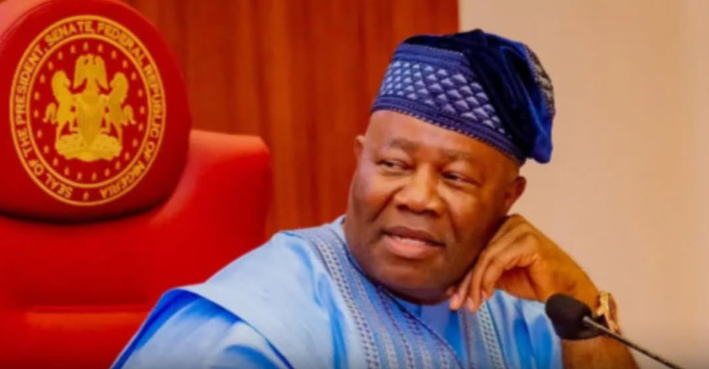
TEARS ON THE PLATEAU: AKPABIO’S EMOTIONAL PLEA AS NIGERIA GRAPPLES WITH UNENDING VIOLENCE
Senate President Godswill Akpabio struck an emotional chord on Saturday as he confronted, in raw and heartfelt language, the deepening insecurity crisis that has plagued Plateau State for years. Speaking at the Jos Polo Field during the formal reception of defectors into the All Progressives Congress (APC), Akpabio lamented the
Senate President Godswill Akpabio struck an emotional chord on Saturday as he confronted, in raw and heartfelt language, the deepening insecurity crisis that has plagued Plateau State for years. Speaking at the Jos Polo Field during the formal reception of defectors into the All Progressives Congress (APC), Akpabio lamented the persistent wave of killings in the state and across Nigeria, confessing that he often sheds tears when confronted with yet another report of lives lost.
Representing President Bola Ahmed Tinubu at the event, Akpabio declared that peace in Nigeria cannot be imported, outsourced, or imposed by foreign actors. He stressed that the responsibility for restoring harmony, unity, and security rests firmly on the shoulders of the Nigerian government and its people, urging citizens to play active roles in rebuilding communities torn apart by violence. His message was delivered with a blend of anguish, conviction, and a call for collective accountability.
Akpabio said the federal government remains committed to restoring normalcy not only in Plateau State but also in every troubled region across the country. He emphasized that no meaningful development can take place when blood continues to flow and communities live in constant fear. According to him, President Tinubu is deeply troubled by the tragic reports that have become a grim reality in Plateau, insisting that the administration is working tirelessly to halt the cycle of violence.
The Senate President spoke with visible emotion as he described how difficult it has become to process the never-ending stories of bloodshed. “I cry whenever I hear that a human being, whether a child or an adult, has been killed,” he said solemnly, his voice echoing through the vast gathering. He described the pain as personal—not just for himself but also for President Tinubu, who he said carries the burden of every lost Nigerian life. “It breaks our hearts,” he stressed. “A life lost is not just a statistic; it is a family shattered, a future stolen.”
Akpabio acknowledged that the Plateau conflict did not begin today, nor is it rooted in the current administration alone. He pointed out that many of the international reports being circulated about the crisis reference events as far back as 2010, a period during which he himself served as governor and saw firsthand the devastation that ethnic, religious, and communal clashes inflicted on Nigerian communities. “This problem didn’t begin today,” he said. “Many people have died in Plateau. Nigeria is crying. Too much blood has been shed, and we are not happy.”
The political gathering in Jos served as both a rally for the APC and a meditation on the fragility of peace in a state that has known too many mass graves and displaced families. Akpabio urged Plateau residents to support President Tinubu’s administration, insisting that peace and development often move hand in hand. He noted that the APC, in his view, remains the only party truly committed to restoring stability to the region, and he implored the people to unite behind the government’s efforts.
But beyond political sentiment, Akpabio’s speech was marked by a deeper appeal—one that called on Nigerians to rediscover the essence of coexistence. “It is not outsiders who will come and give you peace,” he said. “It is we, Nigerians, who must bring peace. We must learn to live together. Without peace, there can be no progress.” His words echoed across the venue, drawing attention to the enduring belief that sustainable peace must begin from within the communities themselves.
The Senate President acknowledged the enormity of the challenges, admitting that the scale of destruction and displacement in Plateau State is far greater than many realize. Entire villages have been wiped out, farmlands abandoned, and families displaced, all in the shadow of recurring violence that seems to resurface just when residents begin to rebuild their hopes. He assured Nigerians that the federal government would intensify its efforts to heal these wounds, emphasizing that aggressive, renewed strategies would be deployed to ensure safety and stability.
Akpabio’s emotional tone resonated with many in the audience, who have themselves been victims of the persistent insecurity that has ravaged the state. For them, his tears were not just symbolic—they were a reflection of a nation exhausted by loss and yearning for healing. Yet, some observers believe that while emotional appeals may ignite hope, the real challenge lies in transforming words into action through concrete security reforms, intelligence-driven operations, and sustained community engagement.
Nonetheless, his message underscored the urgency of collaboration. Akpabio urged Plateau residents to cooperate with government initiatives, reporting suspicious activities, supporting security agencies, and avoiding actions that could inflame tensions. He stressed that lasting peace requires trust, patience, and unity among residents whose lives have been shaped by years of trauma.
He praised President Tinubu’s determination to end the violence, making it clear that Nigeria cannot afford to allow the cycle of killings to continue. He reiterated that the federal government sees the restoration of peace in Plateau as a priority and that efforts are underway to address both the immediate security concerns and the long-term issues that have fueled the unrest. These include economic disparities, ethnic grievances, and land disputes—factors that have historically contributed to the region’s instability.
Akpabio’s appearance in Plateau State, paired with his emotional revelations, may mark a turning point in how top government officials confront the human cost of Nigeria’s security crisis. For many Nigerians, leaders acknowledging the emotional and psychological trauma caused by violence is an important step in rebuilding trust. His tears may have served as a reminder that behind every government official is a human being who feels the weight of the nation’s suffering.
As he concluded his address, Akpabio once again urged Nigerians to unite behind the pursuit of peace, describing it as the foundation of nation-building. From Jos to Zamfara, Benue to Kaduna, he insisted that violence must never be normalized and that Nigerians must collectively reject the forces that seek to divide them. In his view, the country’s destiny is tied to its ability to embrace unity despite its diversity.
In Plateau State, where generations have lived through cycles of attacks, reprisals, and displacement, many hope that Akpabio’s passionate plea will signal the beginning of a more proactive approach to security. Though the problems are deeply entrenched, the Senate President’s message was clear: Nigeria cannot continue on this path. It must chart a new course—one anchored in peace, cooperation, and compassion.
And as the people of Plateau listened, many wondered whether this moment would mark a turning point, or whether it would become another emotional speech lost to the wind. Only time will tell. But on that Saturday at the Jos Polo Field, Akpabio’s trembling voice and unshed tears carried one powerful message—that Nigeria cannot afford to lose another life to senseless violence, and the journey to healing must begin now.
Share this post
Related Posts

BREAKING: Former MLB Pitcher Bobby Jenks Passes Away at 44 After Battle with Cancer
The baseball world is in mourning as former Major League Baseball pitcher Bobby Jenks has...

Love or Luxury? Young Woman’s Dilemma Sparks Heated Debate After Friend Reveals Her Difficult Choice
A seemingly simple question posted online has exploded into one of the most heated relationship...

“I Have No Business With Abraham, Isaac, and Jacob” — Music Producer Ozedikus Speaks on Ancestry and Identity
In a statement that has caught the attention of music fans and cultural commentators alike,...